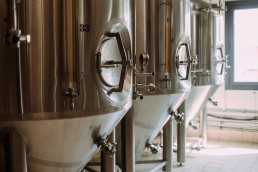The art of brewing: how craft breweries are returning to the roots of beer brewing.
The ancient art of brewing has been lost over time due to the shift to the mass production represented by traditional industrial breweries. The use of modern technology, standardised recipes, mass production through cheap interchangeable ingredients and the loss of community and culture have all contributed to the deterioration of a beer quality and taste. With the development of craft breweries and a renewed interest in traditional brewing methods, there is hope that the art of brewing will once again be celebrated and nurtured as an important part of our cultural heritage. Mass-produced beers as a generic and homogenised product will be transformed into new sophisticated products with the distinct character of locally brewed beer.
Author:
Weronika Pytel

The art of brewing beer has a long history, dating back thousands of years. In ancient times, beer brewing was often done on a small scale, using traditional methods and local ingredients. Over time, as the popularity of beer grew, the brewing process began to evolve and change.
With the growth of industrialisation in the 19th and 20th centuries, the brewing industry underwent significant changes. Traditional and small-scale breweries have been replaced by large industrial breweries that have focused on the mass production of beer using modern technology and standardised recipes. This change had a significant impact on the quality of the beer produced, as the focus shifted from a taste and craftsmanship to efficiency and profitability.
One of the main ways in which the art of brewing has been lost over time is through the use of industrial brewing equipment and automated brewing processes. This has led to a standardised approach to beer brewing, with little room for creativity and experimentation. Traditional brewing methods such as the open fermentation, barrel aging and bottle conditioning have largely been replaced by more modern techniques that put speed and efficiency ahead of quality and taste.
Another factor contributing to the disappearance of the art of brewing is the use of mass-produced ingredients such as cheap, low-quality malts and hops. These ingredients often come from large farms that prioritise quantity over quality, resulting in a bland and generic taste that lacks the complexity and depth of flavour typical of craft breweries.
Finally, the development of traditional industrial breweries has also led to a loss of community and local culture around beer. Small and independent breweries have historically played a key role in local communities, with beer serving as a central focal point for social and cultural gatherings. With the development of industrial brewing, this community-oriented aspect of beer culture has largely been lost, with mass-produced beer serving as a generic and homogenised product that lacks the distinctiveness and character of locally brewed beer.
In conclusion, the ancient art of brewing has been lost over time due to the shift to mass production by traditional industrial breweries. The use of modern technology, the standardised recipes, the mass production of ingredients and the loss of community and culture have all contributed to the deterioration of beer quality and taste. However, with the development of craft breweries and a renewed interest in traditional brewing methods, there is hope that the art of brewing will once again be celebrated and nurtured as an important part of our cultural heritage.
What really makes Craft Breweries different from other Breweries?
Although both craft breweries and traditional industrial breweries produce beer, there are a few key differences between them. Craft breweries focus on the production of unique, high quality products using natural ingredients such as malt, hops and fruit using traditional brewing methods. Traditional industrial breweries focus primarily on the efficiency and profitability of production facilities using modern technologies that downplay the art of brewing by replacing it with mass production from cheap beer substitutes such as corn, rice or artificial flavourings or food syrups. This directly results in a loss of quality, depth of flavour and nutritional value in these beers.
Author:
Tomasz Zawadzki

Beer has been delighting people for thousands of years and the brewing process has evolved over time. With the development of craft breweries in recent decades, there has been a renewed interest in traditional brewing methods and a move away from the large-scale production methods of traditional industrial breweries. But what exactly are the differences between craft breweries and the traditional breweries of the brands we all know?
Craft breweries are typically small and independent companies that produce beer in limited quantities. They often focus on producing unique and high-quality beer styles using traditional brewing methods, with an emphasis on flavour and creativity. Craft breweries usually have a beer bar or tasting room where customers can taste their beers, often in a relaxed, casual atmosphere.
Traditional breweries, on the other hand, are large-scale industrial facilities that produce beer in huge quantities using modern technology and equipment. These breweries often use standarised recipes and ingredients to ensure the consistency of their products. Their main goal is efficiency and profitability, with little emphasis on creating unique craft beers.
One of the main differences between craft breweries and traditional industrial breweries is the brewing process itself. Craft breweries typically use traditional brewing methods such as mashing, clarifying, boiling, fermenting and conditioning, which require a lot of manual labour and attention to detail. Traditional industrial breweries, on the other hand, often use more automated brewing methods shortening the entire production cycle. We are referring to the use of industrial brewing equipment and computer-controlled systems, which are mainly designed to protect the economy of production.
Another key difference is the ingredients used. Craft breweries often use high quality local natural ingredients, including special malts, hops and yeasts. They may also experiment with non-traditional ingredients such as fruits, spices and herbs to create unique flavours and aromas. In contrast, traditional industrial breweries often use cheaper, artificial and mass-produced ingredients that can be sourced in large quantities.
A final difference is the business model. Craft breweries tend to be independently owned and managed, and often put quality and innovation ahead of profitability. They may produce small batches of beer that are only available locally or regionally, and rely heavily on the support of the local community. Traditional industrial breweries, on the other hand, are often part of larger conglomerates and rely primarily on the efficiency and profitability. They can produce large volumes of beer that are distributed nationally and even internationally, and rely heavily on economies of scale to keep costs at a low level. This has a direct impact on the quality of the products.
In summary, although both craft breweries and traditional industrial breweries produce beer, there are several key differences between them. Craft breweries focus on producing unique, high-quality brews using traditional brewing methods and local ingredients, while traditional industrial breweries focus on efficiency and profitability using state-of-the-art technology and ingredients sourced from mass production. Ultimately, it comes down to personal preference, but there is no doubt that the development of craft breweries has brought an exciting new dimension to the world of beer.
What is the Naturalne Piwa (Natural Beers) initiative?
According to the Creators, the new Polish Craft Beers initiative is intended to be an important promotional addition to the beer scene in Poland. Due to the lack of distinction in what really makes craft beers different from industrial beers, it will allow the market to be educated in order to make an informed choice of products. We hope that more people will enjoy the wide range of flavours and styles that can only be found at these craft breweries.
Author:
Tomasz Zawadzki

The craft beer is is a relatively new concept in Poland, but it is quickly gaining popularity among beer drinkers. Unlike mass-produced beers, craft beers are brewed in small batches using traditional brewing methods and high-quality ingredients. These unique local beers have caught the attention of consumers looking for something different from the bland and repetitive varieties offered by industrial breweries.
And this is where the new Polish Craft Beers initiative comes in. The mission of this new initiative is to promote craft beers as being unique and incomparable to other regional breweries or industrial breweries known by the brands themselves. The initiative’s creators carefully select their craft beers with the aim of showing the incredible range of flavours and styles that can only be found in craft beers.
One of the main differences between craft and industrial breweries is the brewing process. Craft breweries use natural fermentation methods, making their beers a healthier alternative to traditional and well-known breweries. Industrial beers, on the other hand, rely on the proven fermentation processes and are not ready for such a revolutionary and innovative approach for fear of decreasing a brand interest. There is no room in the philosophy of a brand producing mass quantities of alcoholic beverages for variations that may or may not appeal to consumers.
Producers of craft beers, on the other hand, target their offer to the most demanding people, who appreciate the highest quality combined with the originality. They are not afraid to experiment with different ingredients and brewing methods, resulting in unique flavours and styles not found in mass-produced beers. The variety of options is endless, from fruity India Pale Ale beers to rich stouts, craft beer producers will provide a beer style for every taste.
In conclusion, the new Polish Craft Beer initiative is expected to be an important promotional addition to the beer scene in Poland, according to the Creators. Their commitment in promoting craft beers as unique and incomparable local breweries is admirable, as well as their mission to educate the market about the distinctiveness of carefully selected craft beers. We hope that more people will enjoy the wide range of flavours and styles that can only be found at these craft breweries.